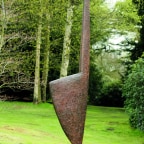Biography
William Turnbull has long been regarded as one of the finest sculptors working in Great Britain today, yet painting has been a vital part of his working life. His sculpture brings together the strong figurative tradition in Western art with the expression of pure form found in older cultures, while his paintings (since 1957) are uncompromisingly abstract. Turnbull sees his paintings in the same way as he sees his sculptures, that is to say, as objects. For him, painting is not about the art of illusion. Whether he is working in bronze or in pigment, Turnbull’s love of surface texture is always in evidence: the strong connection between the eye and the hand being made in a similarly powerful way. The difference between the two disciplines lies in the way the marks are made: calmly deliberate in the bronzes; freely improvised in the paint.
Turnbull has commented that the absorption of nature and the act of painting are two activities reconciled during the act of painting. As he goes on to explain, that is, by projection or extension a dialogue takes place between the artist and his material; and like a conversation it stops when one of the parties involved has nothing to say to the other. It is impossible to pre-plan it is a live performance. That immediacy of the give and take is one of the hallmarks of Turnbull’s painting. Another is his frank enjoyment of colour. As Patrick Elliott has pointed out, the paintings of the late 1950s and early 1960s became increasingly large achieving such a rich, chromatic quality that it was difficult to gauge where the surface of the picture lay. In the same way as some of the sculptures of the period refer to popular culture, such as ‘Screwhead’, 1958, which was inspired by a chocolate vending machine, so the larger paintings of this period allude to the experience of sitting close up to a Cinemascope screen. The experience of pure reds and blues becomes an overwhelming one.








